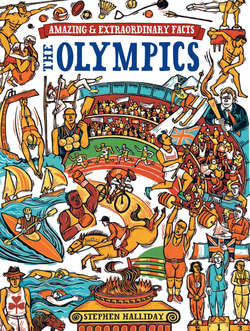Читать книгу The Olympics - Stephen Halliday - Страница 16
На сайте Литреса книга снята с продажи.
ОглавлениеTHE GREEKS JOIN IN!
An Independent Nation
Lord Byron and ‘Tilting at the Ring’
The development of the Modern Olympic movement owes much to the emergence of Greece as an independent state. On 25 March 1821 Greece rebelled against the Turkish rule under which the Balkans had been governed since the 14th century, one of the victims of the struggle for independence being the poet Lord Byron who died at Messolonghi in Greece in 1824. In 1822 Athens was liberated and in 1832 the new Greek state was formed, consisting of a relatively small part of the world of Ancient Greece since it excluded the extensive network of Greek colonies in Turkey, Sicily and North Africa, not to mention Marseilles in France. A German prince, Otto, was foisted as king upon the quite willing Greeks by Britain, France and Russia. After much hesitation Athens, described by Benjamin Disraeli in 1830 as a city without roofs, was chosen as temporary capital of the new nation (they hoped eventually to reclaim Constantinople) and in 1835 it was suggested to the new King Otto that the Olympic Games should be revived and should be held on 25th March, the anniversary of the uprising against the Turks. The idea was attractive to Greek patriots but not to the Greek treasury which had no money. Evangelis Zappas (1800–65) came to the rescue. He began life as a mercenary in the Turkish army but switched sides to join the struggle for independence and later made a fortune from agriculture and shipping. In 1856 he wrote to King Otto offering to fund the revival of the Olympics, with competitors only from Greece and other parts of the Ottoman Empire which included many Greek settlements. In August 1858 a royal decree ordered:
‘National contests to be held every four years and called “Olympics” which have as their purpose to exhibit the products of the activities of Greece especially industry, agriculture and animal husbandry.’
The wording of the decree reflects the priorities of the bankrupt state which saw the event as a trade exhibition to restore the fortunes of the Greek economy with ‘solemn, public athletic games’ confined to the third Sunday of the event.
Lord Byron
In November 1859 the first Modern Greek Olympics took place in Athens, known as ‘The Zappian Games’, with the £10 donated by William Penny Brookes as prize money for the winner of ‘Tilting at the Ring’, a medieval sport which involved a horseman picking up a ring with a lance. It was the biggest prize on offer but was awarded to the winner of the longest foot race, about a mile in length, with an acknowledgement to ‘the Olympic committee of the city of Moudenlok in England’. The race, which took place on a public road, had at one point been impeded by a large fat lady walking her dog. When Zappas died in 1865 he left his large fortune for the Panathenian stadium at Olympia to be restored and used for the four-yearly celebration of the games which continued intermittently. Revival of interest in the games was helped by the fact that from 1875 German archaeologists were excavating Olympia and revealing something of its history. An early visitor to the excavations was the young Oscar Wilde who was punished for arriving late back for term at Oxford. He later wrote, ‘I was sent down from Oxford for being the first undergraduate to visit Olympia.’ In the years that followed, several ‘Olympic’ events were held, some of them described as ‘elite’ games and restricted to wealthy upper-class men. Rope-climbing featured as a popular event, with some games being held in the Panathenian stadium and one, in 1889, in a private gymnasium which resulted in overcrowding and a riot.
Evangelos Zappas
In 1862 King Otto abdicated after a series of quite small protests against his authoritarian rule and returned, with relief, to his native Germany. A referendum was held amongst the Greek population who were all agreed that they wanted a king, albeit a better one than Otto. The overwhelming favourite was Queen Victoria’s second son Alfred, Duke of Edinburgh, who gained 230,066 votes. Second was a member of the Russian royal family with 2,400 votes! However, the one point on which Britain, France and Germany agreed was that the new Greek king should not be British, French or Russian so Prince William of Denmark, who had received six votes, became King of Greece in 1863 as George I. Britain handed over the island of Corfu, with its famous cricket pitch, to Greece as a kind of welcoming gift to the new dynasty where, 58 years later, it was the birthplace of the present Duke of Edinburgh.
Duke of Edinburgh
ROYAL CONNECTIONS
King George I was assassinated by a madman in 1913 after reigning for 50 years. He was the grandfather of Philip, Duke of Edinburgh who was born in Corfu eight years after his grandfather’s death. Born of a Danish father and German mother, he came to England where he was brought up by his uncles, one being Lord Louis Mountbatten. He served in the Royal Navy in World War II, took British nationality and married the future Queen Elizabeth II in 1947. Constantine, former King of Greece, is also descended from the assassinated George I and thus a cousin to Prince Philip.
